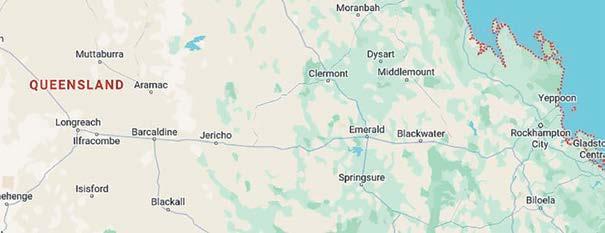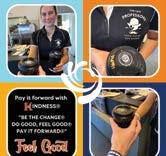






By Matthew Pearce
More than 130 people filled the Yeppoon Town Hall on Thursday, 29 August for the inaugural Harvey Norman Unleash the Business Power Seminar and Expo.
Special guest speakers at the event included Damian Morgan (sales mastery), John Hale (strategy and leadership) and Catherine Molloy (customer marketing), alongside 20 exhibitors representing fields from bookkeeping to recruitment and AI.
Organiser Craig Gibbs, from the Capricornia Chamber of Commerce, said the response was “fabulous” with people attending from as far afield as Gladstone and Biloela.
“A lot of people are still parochial - ‘Oh, it’s in Yeppoon’ - but 60 per cent of the people here are from Rockhampton,” he said.
“We’ve never had an event like this in the region before... But the people attending will leave and tell everyone about it and the next one will be even bigger.”
The crowd was enthralled by John Hale’s opening presentation, as the ‘Strategy Guy’ spoke about leadership and the stages of business growth while sharing a tale about a king deciding on his successor.
“Do you have a claim to fame and are you working towards that, what’s your purpose?” he said. “Leadership is not about being the loudest person in the room, it’s about being a bridge to the future.”
Nine Year 11 and 12 students from Yeppoon State High School attended the seminar thanks to sponsorship from JRT Group of Companies, and teacher Andrew Willis said it was a unique experience for them.
“It’s more than just the presenters, it’s about looking at what happens in the adult world,” he said.
“Our Year 12s are about to go into that adult world and they’re walking around, talking to different businesses about their models, seeing that businesspeople do get together and learning keeps happening after school.
See photos from the event on page 17
Telephone: 07 4863 5050
Address: 5-9 Hempenstall Street, Kawana, QLD 4701
EDITORIAL
Breanna Lloyd Journalist
E: breanna.lloyd@CQToday.com.au
Matthew Pearce Journalist
E: matthew.pearce@CQToday.com.au
ADVERTISING
Cheryl Altouvas Advertising Sales
E: cheryl.altouvas@GladstoneToday.com.au
Lacy McDonald-Hearn
Advertising Sales Executive
E: lacy.mcdonaldhearn@CQToday.com.au
Lou De Jager
Advertising Sales Executive
E: lou.dejager@CQToday.com.au
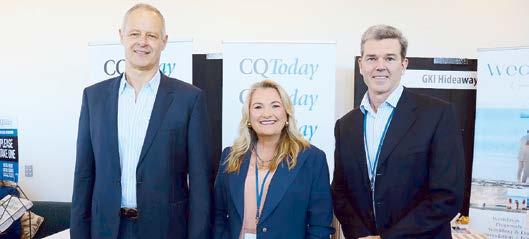
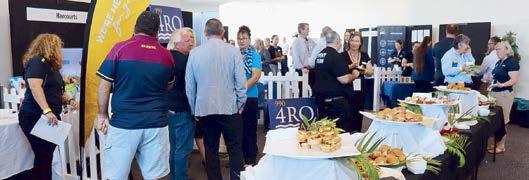
Strong numbers for both units and detached housing are leading an upward trend for building approvals in Queensland, providing a glimmer of hope as the industry continues to call for action on the housing crisis.
The latest figures from the Australian Bureau of Statistics show all regions enjoyed a jump in approvals in the three months to July.
North Queensland led the charge with a standout 94.7 per cent increase, followed by a strong 71.6 per cent hike on the Gold Coast, and Downs-Western at 40.1 per cent.
There were also positive approvals for Central Queensland (28.2 per cent), Far North Queensland (27.4 per cent) and Mackay-Whitsunday (13.4 per cent).
Master Builders Policy and Advocacy general manager Dyan Johnson said while
the July figures were encouraging, there was still room for improvement.
“Approvals for detached houses are now firmly on the up, increasing 4 per cent over the past 12 months,” she said.
“However, the 12-month rolling total for Queensland to July was 33,433 new dwellings, meaning our state’s National Housing Accord target of 49,000 new homes each year remains a challenge right now.
“Master Builders Australia’s (MBA’s) latest forecast for our state reaffirms this, with 224,282 new homes expected to be started in our state over the next five years, making for a shortfall of almost 22,000 on the Accord target. Higher density dwellings are predicted to account for 42.4 per cent of this total.
Ms Johnson said there are steps that can be taken by the State Government, regardless
who is elected come 26 October.
“As called for in our Home Truths state election campaign, stripping away the productivity-sapping elements of the government’s own Best Practice Industry Conditions (BPIC) would be a great start,” she said.
“Our analysis shows BPIC in its current form is driving up construction costs and slowing productivity.
“Other levers that can be pulled include scrapping project trust accounts and rolling back changes to the National Construction Code 2022 that don’t show clear benefit.
“We’re just six weeks away from heading to the polls, and it’s time for all sides of politics to commit to freeing our state from the red tape that has a stranglehold on housing.”
QAL announced the winners of its 2024 Apprentice and Trainee of the Year Awards at a celebratory ceremony in August.
The much-anticipated annual awards ceremony is an opportunity to honour the exceptional achievements of our top performing, mechanical and electrical/instrumentation apprentice and process trainee, acknowledging their remarkable dedication throughout their qualification, presented by the QAL Learning and Development team alongside special guest, Gladstone Region councillor Michelle Wagner.
Operations Learning and Development coordinator Matthew Stewart said the calibre of the apprentice and trainee cohort was outstanding.
“This year alone, QAL welcomed 36 new trainees into the organisation, bringing the total number of program graduates to 215 over the refinery’s history, while more than 845 apprentices have successfully completed their training,” he said.
QAL general manager Trent Scherer announced the award winners for 2024:
• Mechanical Apprentice of the Year, Lainey Goss
• Electrical/Instrumentation Apprentice of the Year, Connor Dromgoole
• Trainee of the Year, Matt Green.
Ms Goss completed her apprenticeship with stellar drive.
She was inspired to pursue her trade after extensive work experience, where she developed a passion for hands-on learning.
“I learn best through the hands-on aspects of my work and enjoy rebuilding components,” she said.
“I worked in the digestion area, completing general maintenance on steam slurry pumps.
“I got to strip them back and rebuild them,

which allowed me to learn how the pumps operate and move, as well as how to fix them.”
Ms Goss received her award after demonstrating exceptional dedication to her work while presenting leadership and maturity when guiding her peers.
She is looking forward to continuing work in
her trade in the future.
Mr Dromgoole was recognised for his flexible approach to working across various sections of the plant while making significant contributions as a team member to tackle challenges.
“I enjoyed completing the dual trade which
gives so many options in the future, meaning I can branch out into something more specific,” he said.
“I’ve been involved in a few big turnaround tasks across different sections, where my experience has been recognised – that was good and I felt valued.”
Mr Green was recognised for initiating invaluable changes to team safety briefings, improving area resources and presenting an impressive level of reliability and a positive attitude among his team.
His commitment to improvement has resulted in section-wide benefits and, upon graduating, he has taken a role in digestion as a full-time employee.
As part of the ceremony, first year apprentices were formally welcomed to QAL, with new apprentices gifted a new, fully equipped toolbox and study texts as part of their welcome to the organisation.
Newly qualified trainees received their Certificate III in Process Plant Operations, celebrating the completion of their two-year traineeship, where they learned the nuances of critical day-to-day tasks to operate the refinery under the guidance of experienced mentors.
QAL’slongstandingapprenticeshipprogram is highly regarded and offers hands-on, on-thejob training, along with nationally-recognised formal qualifications from the company.
Mr Stewart congratulated the award winners on their display of leadership within the organisation and acknowledged the promising future ahead for the students currently completing their program.
“The qualifications our graduates have earned will open doors to endless possibilities for their careers, and many will evolve into skilled mentors for others in the years to come,” he said.
Central Queensland’s construction sector is showing no signs of slowing down, with a robust $8 billion in construction work to be delivered during 2024-25.
Although residential approvals have slowed, the ongoing demand for skilled workers in major infrastructure projects and the renewable energy sector continues to drive the need for workforce development in the region.
Construction Skills Queensland (CSQ) was in Rockhampton recently, encouraging businesses and workers to take advantage of $1.7 million in training funding, which forms part of CSQ’s broader $52 million 2024-25 Training Plan for Queensland’s construction workforce.
CSQ chief executive officer Geoff Clare noted that Central Queensland’s construction
industry will remain under significant pressure over the next 12 months as it undertakes large-scale projects such as the Rockhampton Ring Road and the Aldoga Solar Farm.
“Central Queensland’s residential activity has stabilised, with new approvals down 6.1 per cent from 2022-23. This represents a more sustainable pace, but it’s far from a downturn,”
Mr Clare said.
“At the same time, the infrastructure sector is thriving and requires a continuous supply of skilled workers to keep these major projects on track.
“CSQ estimates that over $8 billion worth of construction work will be delivered across Central Queensland during 2024-25, underscoring the region’s ongoing demand for a skilled workforce.”
Mr Clare emphasised the critical impor-
tance of ongoing training and upskilling for the industry.
CSQ has already observed a rise in training demand within Central Queensland, with notable growth in the employment of construction apprentices.
Currently, 1,354 apprentices are employed in the region, marking a 5.2 per cent increase from the previous year.
CSQ-funded training is available to individuals and businesses of all sizes, from small family-owned trade operations to large-scale workforces engaged in major projects.
The funding typically covers most, if not all, of the costs associated with eligible training programs, ensuring that the construction industry can meet the challenges ahead.

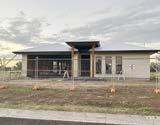
CQUniversity vice-chancellor and president, Professor Nick Klomp has urged the State Government to commit to fully funding CQU’s $59.57 million TAFE Centre of Excellence project in the upcoming election.
“This project has been around for almost a decade and will see all of CQUniversity’s Vocational Education and Training (VET) operations consolidated onto a single site at the Rockhampton North campus,” he said.
“The Queensland ALP Government has supported this project in the past with an $8.4 million commitment at the 2020 State Election to bring over the trades of bricklaying, plumbing, construction and carpentry.”
While the Canning St site has served CQUniversity well over the past decade, it has become increasingly underutilised as various VET courses have been brought over to Rockhampton North.
“A number of other VET courses, including nursing, aged care and heavy auto, have already been brought over thanks to significant investment from CQUniversity. Now it’s time to finish the job,” Prof Klomp said.
“Once we have certainty over our footprint, we will also be able to unlock land on the Rockhampton North campus for desperately needed housing in our region as well as return the current City Campus back to the Queensland

State Government for alternative use,” he said.
“This means hundreds more skilled workers, more housing and the opportunity to fully activate the City Campus for the benefit of the community.”
CQUniversity welcomed the recent commitment from the Queensland LNP to com-
plete the Rockhampton TAFE Centre of Excellence should the party be elected, which was a crucial step forward for CQUniversity and the broader Central Queensland community.
“It is now time for the full potential of this initiative to be realised and bipartisan support is essential.”
Prof Klomp said the project would bring long-term benefits - not just in terms of workforce development, but also in supporting regional growth and prosperity.
“By working together, we can ensure that this project reaches its full potential, providing the skilled workers that our industries need, and contributing to the future growth of Central Queensland.
“Now is the time for all parties to come together and commit to the future of our region, ensuring that CQUniversity can continue to be a leader in education and training that meets the demands of our local economy.”
Since CQUniversity merged with CQ TAFE 10 years ago, Mr Klomp said the university had been progressively consolidating its VET delivery from the City Campus to the Rockhampton North campus with an objective of establishing a world-class, state-of-the-art training facility to support the skills’ needs of current and future workforces.
Once completed, the TAFE Centre of Excellence will deliver hundreds of extra skilled workers meaning more tradies on workshop floors across industry, more construction workers building desperately needed houses and more skilled locals to fill much-needed roles in industry and our small business community.
The transformation of Alpha HPA’s Gladstone-based project into the largest singlesite, ultra-high purity, aluminium materials refinery in the world is officially underway with the company celebrating the breaking of ground as the start of Stage Two construction earlier this month.
Alpha HPA’s 10-hectare, state-of-the-art Stage Two facility will leverage the established Stage One operation, and Alpha HPA’s novel, and Australian owned and developed process IP.
At full scale, the site will be capable of producing over 10,000 tonnes of high-purity aluminium products per year, creating 120 ongoing local jobs on top of the 300 jobs during construction.
Alpha HPA’s managing director Rimas Kairaitis said there was extensive funding support in place to progress to full scale production.
“Today (Tuesday, September 3) marks a significant step forward for Alpha HPA, the Gladstone community and for high technology manufacturing in Australia,’’ he said.
“The start of Stage Two construction at our Gladstone site not only underscores our commitment to innovation and excellence but also solidifies our position as a global leader in ultra-high-purity aluminium materials.”

“We are proud to leverage our Australianowned and developed process IP in creating a state-of-the-art facility to service high
technology electronics industries, that are so important in the energy transition. This project is a testament to the incredible po-
tential of homegrown technology and its ability to compete on the world stage.
“Securing extensive funding support from our shareholders and the Australian and Queensland Governments and has been pivotal in moving this project forward, and we are now well-positioned to progress to full-scale production.
“The economic and community benefits for Gladstone will be substantial, with longterm job creation and opportunities for local businesses.”
Alpha HPA’s proprietary process technology offers a unique opportunity to manufacture a wide range ultra-high purity aluminium material that are cost competitive, low-carbon and which leverages off established industrial infrastructure in Gladstone.
The process allows for the extraction and purification of aluminium from industrial feedstock, producing materials of exceptional purity for high-technology applications, including the semiconductor, lithium-ion battery, and LED lighting sectors.
Alpha has secured a $400 million Australian Government debt facility and raised $180 million in equity to fund the Stage Two development.



By Matthew Pearce
Queensland Resources Council (QRC) chief executive officer Janette Hewson is “looking for some long-term thinking” when it comes to Queensland’s coal royalty tax.
Speaking at Rockhampton’s Frenchville Sports Club earlier this month, Ms Hewson said QRC had relaunched its Keep Queensland Competitive Campaign across broadcast, digital and social media in an effort to keep the coal royalty issue as part of the public discussion in the lead up to next month’s state election.
“Our campaign is about featuring everyday Queenslanders from Central Queensland who rely on the resources sector either directly for their jobs or indirectly through local businesses that they operate or work for,” she said.
“We’ve got to strike the right balance with our coal royalties’ framework here in Queensland to ensure our sector can continue to deliver revenue to the people of Queensland that own the resources in the ground that provide those essential services that we all need.
“But it’s also about making sure that companies have confidence to invest in Queensland long-term.”
In 2022, the State Government introduced three new tiers to the state’s coal royalty structure, which QRC has called the “highest in the world”.
“There is still some movement in terms of investors buying existing assets, but what we’re worried about are the more medium or longterm impacts,” Ms Hewson said.
“In the next few years, we’re going to see some coal mines start to close. Normally what happens is there is a big pipeline of new projects going through, but what we’re seeing is a decrease in that pipeline.
“We see people whose companies have options to invest anywhere in the world or elsewhere in Australia and they’re looking at Queensland and saying Queensland’s not competitive for us to invest our capital there for 20-

plus years.”
Ms Hewson said QRC was happy to work with whichever party was in power after the next state election.
“We need to look beyond October 26, we need to look beyond even the next election cycle, and we need whoever is in government to sit down with us and find a solution that strikes that right balance,” she said.
“And if we can do that, we have that long term financial security for Queensland covered.
“We need people to understand that this might not be a problem today, it might not be
a problem tomorrow, but it will be something that we’re going to see in the next few years.
“It is really important for Queenslanders’ jobs that we act now and secure that future.”
Deputy Premier Cameron Dick said businesses were continuing to invest in Queensland.
“Since the new coal royalty tiers were implemented from 1 July 2022, a range of coal producers including Whitehaven Coal, Peabody Energy, Stanmore, Coronado, Thungela Resources, Bowen Coking Coal, Sumitomo and Pembroke Resources have all made public statements or taken actions indicating clear
By Matthew Pearce
Prime Minister Anthony Albanese says the Federal Government will work with the State Government to identify priority Bruce Highway projects after a ute and truck carrying ammonia nitrate crashed at Bororen on Friday, 30 August.
Speaking while in Rockhampton, Mr Albanese said he had spoken with Premier Steven Miles that morning to discuss the situation.
Federal Infrastructure Minister Catherine King has also written to State Roads Minister Bart Mellish about infrastructure investment in Queensland, including the Bruce Highway.
Mr Albanese said he was familiar with
Bororen, having “driven the length of the Bruce Highway” in the past.
“It’s a lovely small village, and the tragedy that we saw is heartbreaking,” he said.
HesaidwhileitwastheStateGovernment’s responsibility to fix the immediate issues impacting the highway, the Federal Government would work with their state counterparts to identify priorities regarding future projects.
“We do have some funds available, and we’ve written to the Queensland Government asking them if there are any proposals that can be brought forward to accelerate particular spots on the highway,” he said.
Mr Albanese said the State Government
INNOVATING PORTABLE BUILDINGS
- COMPLETELY OFF-GRID
- MEET YOUR SUSTAINABILITY GOALS
- IMMEDIATE SITE ESTABLISHMENT REDUCE POWER COSTS
- DESIGNED FOR INDUSTRY, MINING AND CONSTRUCTION
was in the best position to identify those priority projects, as well as to work with local governments.
He said the ALP had invested $10 billion in the Bruce Highway as part of a more than $20 billion contribution to infrastructure in Queensland, which includes projects like the Rockhampton Ring Road project.
“Since we’ve come to office as well, we’ve turned the Rocky Ring Road from something that wasn’t properly funded and wasn’t under construction into now being fully funded and under construction,” he said.
“In addition to that, we have record funding for the Black Spots program as well as $200 million for the Safer Roads program as well.”
plans to continue to invest in the Queensland coal industry,” he said.
“That includes BHP, who were highly critical of those new progressive coal royalties and of course Mike Henry then ultimately turned around and said the coal mines that “BHP operate in Queensland were high-value assets and they would continue to invest $1 billion each and every year into their operations in Queensland, they then tried to buy Anglo American’s Queensland coal mining assets.
“Make no mistake, the QRC is a mining lobbyist, paid by mining companies to advocate to increase mining companies’ revenue.”

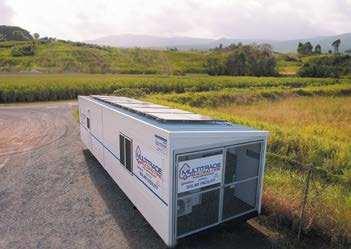

12685886-MS29-24

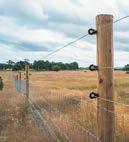



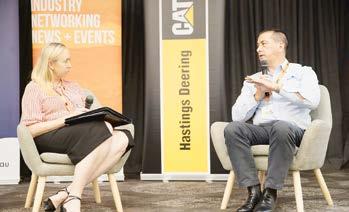
The annual Bowen Basin Mining Club Rockhampton lunch hosted a sold-out crowd of resource sector businesses and supporters, featuring an industry address by Janette Hewson of the Queensland Resources Council (QRC) and a fireside chat with Paul Flynn of Whitehaven Coal.
Introducing the event on Thursday 4 September, Rockhampton Regional Council Mayor Tony Williams acknowledged the mining industry’s importance to the local economy.
“Forty per cent of the Rockhampton economy relies on the resources sector, with 12,000 local direct jobs in the local council area, and a further 6,000 jobs in neighbouring Livingstone,” Cr Williams said.
“Our region is renowned for its talented workforce and diverse businesses which provide unmatched support and connectivity to the growing minerals sector and coal mines on our doorstep.
“Council, through Advance Rockhampton is proud to see the Bowen Basin Mining Club return for another year and facilitate discussions between the mining industry and our community.”
This importance was echoed in QRC chief executive officer Ms Hewson’s industry update.
“Here in the Fitzroy region, which includes Banana, Central Highlands, Gladstone and Rockhampton Local Government areas, the resources sector spent $4.2 billion in the 2022-23 year, including with 2,438 local businesses and 549 charities and sports clubs,” Ms Hewson said.
“Since June 2023, the resources industry in Queensland exported $58.3 billion worth of coal, with $48.4 billion of that as metallurgical coal and $9.9 billion worth of thermal coal.
We are Queensland’s biggest export industry, comprising 82% of all exports when you consider the LNG industry as well.”
As the state counts down to the 2024 elec-

tion, Ms Hewson used the opportunity to highlight the QRC’s 2024 Election Priorities.
Focusing on competitive and stable policy, a fair return for the regions, skills for the future, and energy security, diversity and transi-

tion, the QRC’s priorities are aimed at keeping Queensland competitive.
“We’re offering real solutions to the incoming government, not just a statement on how things aren’t working,” Ms Hewson said.

“The QRC is sending a clear message to all sides of politics that the industry must be consulted to ensure a pipeline of investment in resources for the security of Queensland’s future.”
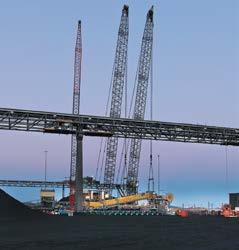

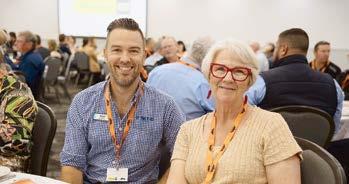
Whitehaven Coal chief executive officer Paul Flynn joined Bowen Basin Mining Club director Jodie Currie for a fireside chat to round out the luncheon’s program.
As the recently established owners of both Blackwater and Daunia mines in Central Queensland and the proponents of the recently approved Winchester South Mine, Whitehaven is now a significant player in the Queensland mining industry.
Mr Flynn was buoyant about the company’s presence in Queensland, saying that the balance of Queensland assets brought a significant diversification to Whitehaven.
“We were drawn to Queensland to balance our business with the acquisition of metallurgical coal assets, rounding out our thermal coal portfolio in New South Wales’ Gunnedah Basin. Whitehaven now has scale and long-life assets in the Bowen Basin, with 20 Mtpa in QLD to balance our 20Mtpa of capacity in NSW,” he said.
“While our first quarter results are satisfying, there has been some change to the way we
operate. Our company is structured very differently, with a lot more simplicity, but we’ve seen a whole new enthusiasm in the workforce on our Queensland sites.”
Commenting on the recent sell-down of 30 per cent interest in Blackwater, Mr Flynn linked the strategic choice to bringing Whitehaven closer to its customers.
“The demand through the competitive asset sale showed that interest in the Blackwater and Daunia assets were very high,” he said.
“We see long-term value in partnering with Nippon Steel and JFE as long-term tier one users who want our metallurgical coal.
“Their partnership validates the ongoing demand for our product internationally.
“However, their investment is also tinged with a hint of anxiety about the future of supply, based on the current royalty scheme in Queensland.
“As long-term purchasers of Blackwater coal, these companies no longer believe there is security in Queensland policy, and that should be worrying.”
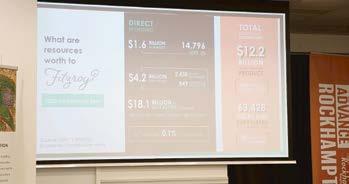
Speaking further on royalties, Mr Flynn was to the point - the top-tier rate of 40 per cent not a royalty, it’s a super profits tax.
“The cost base of the coal industry has just increased in response to the royalties - driving inflation rather than balancing it,” he said.
“As a company, we are up for paying royalties on the resources we mine.
“However, we are putting the capital up and taking all the risks, and now the peaks of our returns have been well and truly capped. If we have lower margins and more volatile returns, the entire industry - right through to suppliers - suffers.”
Of clear importance to Whitehaven is the establishment of the company as a long-term partner to the communities in which it operates.
Mr Flynn used the event to announce that 23 November will be the first Whitehaven Coal open day at Blackwater.
“We want the community to understand the value of us being in the region,” he said.
“We want people to be employed in the re-
gion, and we want them to stay.
“We understand a residential workforce based on our NSW operations, and we’re looking forward to the opportunity to invest as much as we can in Central Queensland.”
This extends to suppliers, with all supplier contracts brought across with the operations and a new procurement portal established on the Whitehaven website for suppliers new to the company.
Mr Flynn also spoke about Whitehaven’s role in the newly formed Coal Australia, saying it doesn’t replace any existing advocacy, but helps to streamline coal’s messaging in the Australian marketplace and educate Australians about the need for coal into the future.
“The Bowen Basin is the premium coal basin in the world, positioned in relation to both existing and future consumption,” he said.
“We have both quality and proximity to market - and our company has just invested $7 billion to become a part of Queensland’s metallurgical coal industry - so of course we see a strong future here.”



Leading electrical engineering manufacturer NOJA Power was named Queensland Exporter of the Year at the 2024 Premier of Queensland’s Export Awards earlier this month.
A diverse range of Queensland businesses contested across 15 categories at the awards dinner with NOJA Power taking the top gong.
From the 46 finalists, 13 national category winners will represent Queensland at the Australian Export Awards at Parliament House in Canberra in November.
Queensland was the first state in Australia to introduce a First Nations category in 2023 and continues to recognise Women in International Business in a dedicated category.
Sobah Beverages, maker of non-alcoholic craft beer, took out the First Nations category while Seipel Group chief executive officer Dr Tracey Seipel was awarded the Women in International Business honour.
Premier Steven Miles and Treasurer Cameron Dick announced the winners at the ceremony held at the Brisbane Convention & Exhibition Centre.
Now in their 34th year, the Export Awards recognise Queensland businesses for their innovation, resilience and determination as they strive to grow and expand their global footprint.
Mr Miles enjoyed the first awards he had attended as Premier, saying it is an acknowledgement of the hard work put in by exporters.
“Exports are the engine of this economy. We are a trading state,” he said.
“A big congratulations to NOJA Power for being named Queensland Exporter of the Year – they truly represent all that is impressive about our exporters and about Queenslanders doing business around the world.
“From a small start but with global ambitions the founders now export to more than

100 countries and employ more than 300 staff.
“All from scratch. It’s an amazing story we should all celebrate.”
King River was named the Regional Exporter of the Year.
King River’s attention to detail is evident in every stage of the paddock to plate process, with refined Wagyu breeding and genetics underpinning the King River experience.
With a vision to share this experience globally, King River Wagyu can now be enjoyed in more than 30 countries.
FINALISTS AND WINNERS
• ADVANCE TECHNOLOGIES: Ryan Aerospace.
• AGRIBUSINESS, FOOD AND BEVERAGES: Frosty Boy Global.
• CREATIVE INDUSTRIES: Alt.vfx
• E-COMMERCE: Lock Jaw Ladder Grip
• EMERGING EXPORTER: Burleigh Wagon
• INTERNATIONAL EDUCATION AND TRAINING: Audeara Limited
• MANUFACTURING AND ADVANCED MATERIALS: Centor
• PROFESSIONAL SERVICES: JB Pacific Scien-
tists and Engineers
• REGIONAL EXPORTER: King River
• RESOURCES AND ENERGY: Mine Energy Solutions
• SMALL BUSINESS: Marine Air Flow International
• SUSTAINABILITY AND GREEN ECONOMY: NOJA Power
• FIRST NATIONS: Sobah Beverages
• WOMEN IN INTERNATIONAL BUSINESS: Dr Tracey Seipel, Seipel Group chief executive officer
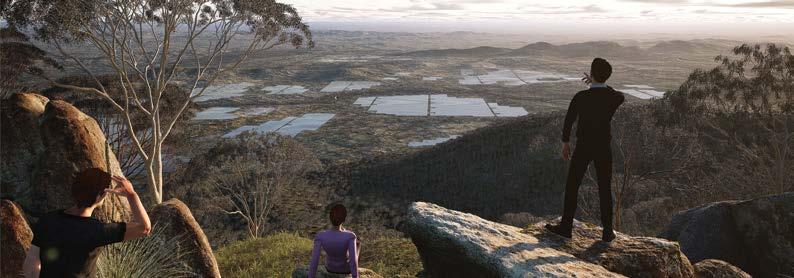
820,000
By Karen Simmons
Solar Power Gladstone has moved to a shiny new location recently and celebrated with a Grand Opening event last month.
Now located at 35 Toolooa Street, Gladstone, the award-winning team opened the doors to the community with giveaways, a free sausage sizzle and drinks, and music with Hamo from 4CC, doing his thing on a live radio broadcast.
Regular customers and newbies got the chance to drop in and learn not only how solar works on your home, but what it would look like with three working inverter/battery combination demonstrations. It was only in November last year that owner Murray Kay and Philip Christian from Solpac Energy Solutions won best domestic solar design and installation of the year in Australia by the Clean Energy Council. Murray designed the state of the art 17.6kW Hybrid solar system project for a client and at the time he said, ‘this is the future’.
“This system is 17.6kW of panels through two 5kW hybrid inverters with two 11kWh battery banks and export control to 5 kWh, as this is only a single-phase system,” he said.
“Systems like the 17.6kW installed on here is the future, as we now need to produce our own power rather than take it from the highly expensive grid.”
Solar Power Gladstone is a locally owned and operated business that knows and understands solar. They are solar specialists who know what works and what doesn’t, and they come to you.
It’s the team’s vision to assist the Gladstone community in better understanding the benefits of solar and overcoming high energy costs by providing sustainable, affordable and innovative energy solutions - all done locally.
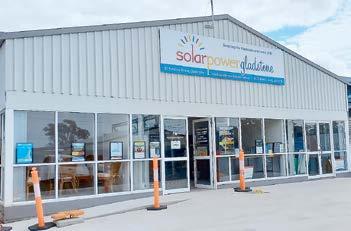

For more information on Solar Power Gladstone, you can visit www.gladstonesolarpower. com.au, drop into the new store at 35 Toolooa St, Gladstone, check out their Facebook page or phone 4972 8449. The innovative



Rural Bank’s Australian Agricultural Exports Report 2023/24 has found that the value of Australian agricultural exports fell by 8.5 per cent to $72.4 billion or $6.7 billion lower than the record high achieved in 2022/23.
But there is good news for the Sunshine State with Queensland and Victoria the two states to see export growth.
States with large cropping industries saw the most significant declines, with Western Australia, New South Wales and South Australia most impacted by the dip in this sector.
Of note, growth in agricultural export value from Queensland was driven by increased beef exports, accounting for 57 per cent of the state’s exports - elevating Queensland to second place, above Western Australia and New South Wales and behind Australia’s export value leader, Victoria.
“Cropping exports led the overall decline in Australian agricultural export value in 2023/24, but while the value of crop exports fell $8.4 billion or 27.3 per cent, we have still had the second most valuable export year on record,” Rural Bank’s Industry Affairs senior manager Neil Burgess said.
“Overall, agriculture accounted for a slightly greater share of Australian goods exports, growing to 13.5 per cent - and with cropping out of the mix, the value of other agricultural commodities actually rose by $1.7 billion (+3.6 per cent) to what was a record high for the year.
“Cattle industry exports saw the largest growth in value, with a rise of $1.6 billion or
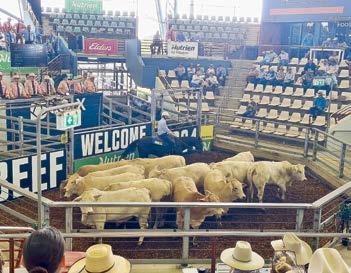
more than 12 per cent, driven by increased production and strong US demand followed by a moderate lift in sheep industry exports to
a
lifted to the highest level on record and sugar is now just behind dairy in terms of export value, with a strong rise of more than 40 per cent on top of an impressive fourth consecutive year of increased sugar production and a surge in prices.
China remains firmly in number one position as Australia’s top export market for agricultural commodities with an increase in export value for a third consecutive year of 2 per cent to $16.8 billion, now accounting for almost a quarter of total export value.
“Export growth to China was driven by barley, cotton and wine with combined growth of $3.6 billion in 2023/24, while the value of all other products to our largest trading partner fell $3.2 billion (20 per cent) led by significant falls in wheat, dairy, wool, sheep meat and horticultural produce,” Mr Burgess said.
“Exports to the US leapt an impressive 21 per cent to $6.8 billion, driven by beef exports, with Australian beef export value again set to increase in 2024/25 as further growth in production combines with higher average prices supported by tight US supply.
“China and the US aside, Australia’s other 11 major export markets saw declines in export value in 2023/24, however export value to eight of these markets remained above 2021/22 levels. Japan fell behind the US for the first time in almost a decade and Indonesia climbed ahead of Vietnam in the top ten export markets for 2023/24.”
Queensland’s total rural debt has risen to $29.37 billion, up 8.82 per cent from $26.99 billion in 2021, according to the 2023 Queensland Rural Debt Survey.
The survey was undertaken by the Queensland Rural and Industry Development Authority (QRIDA) in collaboration with the Queensland Government’s Statistician’s Office (QGSO) and with the support of all major lenders and insights from agricultural industry organisations.
While the total debt has risen, the quality of that debt has improved, with 96.35 per cent rated viable and potentially viable long-term, up from 94.96 per cent in 2021.
The average debt per borrower is $1.75 million in 2023 up 12.14 per cent on 2021 and the number of rural borrowers has decreased by 2.96 per cent to 16,799.
QRIDA acting chief executive officer Brooke Irwin said the survey painted an indepth picture of the financial landscape of rural enterprises over the past two years.
“The latest figures show Queensland’s rural debt has grown in both total value and quality between the December 2021 to 2023.
“These results come off the back of an increased State Rural Gross Value of Product due to improved commodity prices and seasonal conditions, including above average
rainfall across the majority of the state over the survey period.
Amongst the nine industries that recorded an increase in rural debt, the beef sector ranked the highest with a rise in debt of $2.54 billion due to improved farm gate prices and the significant rise in rural land values.
“Queensland is the beef state and represented the largest portion of Queensland’s rural debt, and it is important to note the quality of that beef debt also improved along with cattle and calf GVP and a substantial growth in Australia’s cattle herd,” Ms Irwin said.
Meanwhile, the cotton and sugar industries recorded the largest decreases in debt
with reductions of $219 million and $178 million respectively due to improved crop yields and prices.
The three regions with the highest levels of rural debt were the Western Downs and Central Highlands, Southern Coastal Curtis to Moreton, and Eastern Darling Downs with a combined72.90percentofthetotalruraldebt.
These regions represented the same proportion of total rural debt as in the previous 2021 survey due to the large primary production activity and diverse range of industries in these regions.
The next Queensland Rural Debt Survey is scheduled for December 2025.
The average Australian stays in a job for just 3.3 years and very few businesses have intergenerational employment now, so having eight family members spread over four generations working for the same company is incredibly rare and yet that’s what members of the Lunn family have done at Isis Central Sugar Mill.
Isis Mill chief executive officer Craig Wood said the relatives of the McDonald/Lunn family had worked, trained and progressed through the Mill with a grandfather, father, brothers, wife, sons, siblings and in-laws all at some stage being on the payroll of the Mill.
“Isis Mill workers are the strength of our mill with their skills and dedication enabling us to support growers and shareholders over more than 100 years.
“This is illustrated by the generations of some local families who have been part of the Mill’s fabric, like the Lunn family now,” Mr Wood said.
Tony Lunn, Mill engineering coordinator operations, has been at Isis Mill for 35 years and proudly recounts the employment of his grandfather, father, brother, wife, sons and inlaws in the long line of Mill employees.
“My grandfather, Fred McDonald, started working at the Mill in the 1960s, then, my father Col Lunn was the fitting shop forman for 44 years,” Mr Lunn said.
“My brother John did his apprenticeship here as a fitter and turner then progressed to
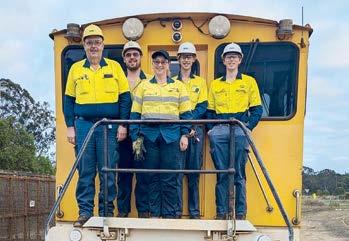
cad draftsman and then I started in 1989 as an apprentice.
“I was given the opportunity as a shift officer then from 1992 I was a power house attendant, Milling Train console operator, shift fitter, shift
supervisor, assistant chief engineer and now engineering coordinator operations,” Mr Lunn said.
But that’s just the start of the Lunn family’s employment history with his wife Helen work-
ing in the Mill labs before moving into weighbridge operations then now fulfilling her long held dream of being a worker On the Mill locos as an offsider.
Tony and Helen’s eldest son, Nicholas, is a diesel mechanic at the Mill with their middle son, Chris, working in warehouse management and their youngest son Ben starting as a store person in April.
Amazingly, it’s not just the Lunn’s but Helen’s side of the family that also have worked at the Mill with her father Ian Haaksma and her brother also having been employed as a labourer and apprentice boiler maker respectively.
“The Mill has always been a major employer in the Childers community,” Mr Wood said.
“We support local staff and are keen to see staff trained, employed, upskilled, promoted and part of our Mill family for the long term.”
The Australian Bureau of Statistics reports that in February 2024 only 43 per cent of workers had worked for the same employer for over five years and 19 per cent of workers had been in their current job for less than one year.
“We are grateful that Tony and Helen Lunn and their extended family have been such a loyal and hard working part of the Isis Central Sugar Mill story over so many decades and so many generations,” Mr Wood said.
Beef2024 set a new record for economic impact.
A new independent report, conducted by IER, revealed the event generated $102 million in direct and incremental expenditure for the Greater Rockhampton Region and $69.6 million for Queensland.
Beef Australia chairman Bryce Camm said the results were simply outstanding and cemented its status as the largest beef industry event in the Southern Hemisphere.
“Beef2024 has further solidified its status as a key driver of economic activity, not just for the Australian beef industry, but for the Greater Rockhampton Region and the rest of the state,” Mr Camm said.
“With the return of international visitors, a surge in student involvement, and the highest number of exhibitors, competitors, and partners we’ve seen to date, we set ourselves the ambitious goal of surpassing the 2021 figures in 2024.
“The results of our third-party economic and social impact research study, conducted by IER, surveyed attendees and exhibitors in the weeks following the event, and the findings are nothing short of amazing.
“I’d again like to thank all our wonderful volunteers, committee members, sponsors, competitors, exhibitors, staff, fellow board directors, and, of course, our guests.
“This event does not happen without the contributions of people who are passionate about our industry and community, and they ensure it has a bright and bold future.”
Beef2024 Economic and Social Impact IER Research Study Key Findings:
Beef2024 attracted a total of 125,576 attendances (a 7.73 per cent increase from 2021) across the seven-day event. The research suggested that across the entire audience, an attendee visited the event on average 2.6 times.
Beef2024 created a direct and incremental expenditure impact for the Greater Rockhampton Region of $102.0 million. For the Queensland economy, Beef2024 was responsible for contributing $69.6 million.
Key economic impacts for the Greater Rockhampton Region and Queensland economies are outlined below:
The event generated a value-added impact of $92 million for the Greater Rockhampton Region, supporting 721 full-time equivalent jobs.
The event generated a value-added impact of $94.5 million for Queensland, supporting 659 full-time equivalent jobs.
Visitor origins of unique individuals to the event represented:
• Greater Rockhampton Region 37.9 per cent



Close to 38 per cent of the attendees for
came from the Greater Rockhampton Region, with 35.4 per cent visiting from other parts of Queensland, 22.8 per cent from interstate and 3.8
• Intrastate 35.4 per cent
• Interstate 22.8 per cent
• International 3.8 per cent
Beef2024 resulted in 163,120 visitor nights generated across Queensland, including 110,789 in the Greater Rockhampton Region.
82.3 per cent of attendees rated their satisfaction with Beef2024 as good to excellent, with 36.7 per cent of attendees suggesting that the event exceeded their expectations.
97.9 per cent of attendees agreed that Beef2024 is the place where the beef industry meets.
Agriculture, Fisheries and Forestry assistant minister Anthony Chisholm said the government is a proud sponsor of rural and regional events.
“Beef2024 showcases the influence our beef industry has on communities, workforce and the economy,” he said.
“We’re proud to provide $6 million to
Shane McCarthy will become the new AgForce general president.
The current AgForce deputy chair and North regional director is set to step into the role at AgForce’s AGM in Goondiwindi on Tuesday, 12 November.
He replaces Georgie Somerset who has led AgForce for the last six years.
AgForce chief executive officer Michael Guerin acknowledged Mrs Somerset’s dedication to AgForce.
“Georgie’s leadership has been significant and consequential over her six-year term as General President,” he said.
Mr McCarthy said he is humbled and excited by the opportunity to lead such an important industry organisation.
“I would like to thank Georgie for her tireless dedication over the last six years as well as the other out-going board members, commodity board members and regional council
members in defending and promoting Agriculture in Queensland,” Mr McCarthy said.
“Georgie has built strong momentum around significant issues for industry, and I look forward to acknowledging those fully at the AGM and ensuring the organisation maximises that momentum for ensuring policy settings allow industry and community to thrive.”
“I am excited to work with returning and incoming electees to advocate for our food security that is so important to our nation.”
Mrs Somerset congratulated Mr McCarthy on being elected general president.
“Representing AgForce members is both a privilege and a responsibility - one where the focus is always on making it easier for our members to grow food and fibre,” she said.
“I am confident Shane will continue to focus on our member’s priorities and do an outstanding job in the role.”
Beef2024, an event that brings together producers, scientists, and participants from across the agriculture sector.
“Our support demonstrates the Albanese Government’s commitment to standing side by side with industry to build a profitable, productive and sustainable beef sector, now and into the future.”
Beef Australia chief executive officer Simon Irwin said Beef2024 has set a new benchmark for future events.
“We had 4,509 cattle entrants participate across three championships, $44 million worth of cattle on site, more than 600 registered international visitors representing 39 countries experience the event for the first time since 2018”, Mr Irwin said. “Our Beef TV program reached over 79,000 people globally, we signed an MOU with the Canadian Western Agribition, welcomed over 40 state and federal politicians, and hosted over 150 accredited journalists.
“Additionally, we’ve seen a marked increase in the participation of school students, a positive trend that we hope reflects the interest in careers within the beef and agricultural industries.
“This momentum is paving the way for an enhanced program for Beef2027 that will continue to showcase and celebrate the Australian beef community on a global stage while driving significant economic activity.
“On behalf of the organisation and board of directors, I’d like to once again thank our local, state, and federal government partners, our competitors, sponsors, and the local community who have all been instrumental in the event’s success.
“Beef2027 is scheduled to take place back in the heart of the Beef Capital of Australia between the 2nd and 8th of May 2027, and we can’t wait to deliver yet another record-breaking event.”
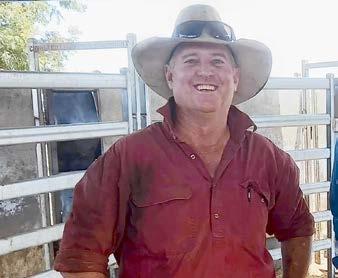
Bravus Mining and Resources has unveiled the newest, and biggest, peer supporters for the industry-leading mental health program run at its Carmichael mine near Clermont.
Bravus Mining and Resources Health and Safety manager Graeme Furnell said two of the operation’s fleet of 200-tonne CAT 796AC mining trucks had been fitted with trays painted in ‘peer supporter purple’ to remind the workforce that support is available should they be going through a tough time.
“More than 1,200 workers live at Carmichael during their swing and over time we’ve built a great sense of community among the people here,” Mr Furnell said.
“A big part of that is we all look after each other’s mental health and wellbeing while we’re at work and away from our usual support networks, and fundamental to that is our peer supporter program.
“Everyone needs an avenue to get things off their chest and the beauty of the peer-on-peer support system is it builds on existing relationships.
“There’s no need to worry about judgment — you’re just talking to a mate who has the skills and training to listen, and, if necessary, help you access the primary care services we partner with.
“Adding the two haul trucks to our contingent of peer supporters is another highly visual way of reminding the workforce that support is available if they’re going through a tough time.”
The Carmichael Mine peer supporter program is a whole of operation initiative, with representatives in the mining and maintenance space with MacKellar Group, at the Coal Handling and Preparation Plant through DRA Global, and within the site’s accommodation villages with Sodexo Australia.
MacKellar Service Truck operator Sarah
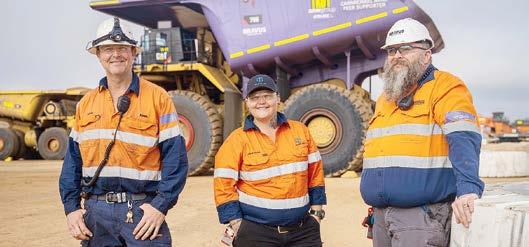
Payne said she volunteered to be a Carmichael peer supporter because of her passion for people and her workmates.
“People often come to me for a chat, and that’s what I’m here for — to help a mate,” Ms Payne said.
“If they walk away from our conversation with a smile or feeling lighter, then I know I’ve done my job.
“Every peer supporter participates in training to make sure we have the strategies, skills, and processes to be able to effectively provide support for others under stress.
“Importantly, we’re also taught how to look

after ourselves as part of the program.”
The special peer supporter trays were manufactured and painted by Rockhampton’s SWM Group, supporting the local employment of more than 50 skilled tradespeople.
“To put one of these 796 trays together is ongoing employment for 54 of our boilermakers and welders,” SMW Group chief executive officer Cameron Tragardh said.
“We’ve had a long and successful relationship with Bravus, and we congratulate the team on this mental health initiative and for continuing to support Australian-made and local manufacturing.”

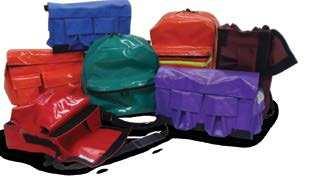
Henden’s Upholstery & Canvas is a locally owned, family run business that has been providing quality products for over 50 years. They specialise in the manufacturing of custom made:
• Tradesman tool bags
• Document bags
• Safety permit wallets
• Machinery/Instrument covers
• Protective industrial covers
• Ship loader chutes
• Tarps, tonneau covers & shade sails
• Repair & maintenance work and much more
Henden’s specialise in understanding their client’s needs and providing custom solution driven designs. All products are manufactured on site at their workshop.
Find out how we can assist your team today.

Phone: 4972 3252
Email: admin@hendens.com.au
Website: hendensindustrialupholstery.com.au
Find us on

Central Queensland’s industrial and energy future will be outlined at the 2024 Gladstone Engineering Alliance (GEA) Major Industry, Energy and Manufacturing Conference on 2-3 October 2024.
The conference is set to return over two action-packed days at the Gladstone Entertainment and Convention Centre.
The principal partner of the conference is Aestec Services.
“At Aestec Services, we are proud to have contributed to the growth of the Gladstone region for over 20 years, including our seven-year partnership with GEA for the Major Industry, Energy & Manufacturing Conference,” a company spokesperson said.
“As a trusted Civil Construction and Maintenance company, we are driven to build a stronger future with the work we do.”
Gladstone is the gateway to Central Queensland’s and the state’s industrial and renewable energy sector.
The 2024 conference will provide an opportunity to gain insight into where industry, energy and manufacturing is heading and the available opportunities emerging within broader CQ as the nation, state and region progresses through the renewables transition.
The conference provides superior networking conditions to reinforce relationships and gathering information to get a head start in the evolving business opportunities in store for the future.
What to expect:
• Attendees will hear from a variety of influential guest speakers working in the heart of emerging industrial projects, the transition towards renewable energy, and sustainable manufacturing.
• 2024 Conference delegates will have an ex-
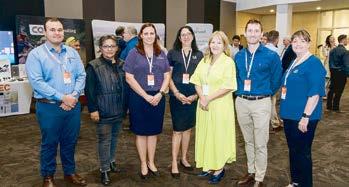
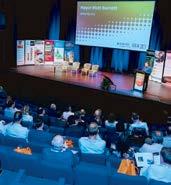


clusive opportunity to jump on-board the Gladstone Industry Bus Tour to hear more about the ever-evolving industrial landscape in conjunction with some major project announcements.
• Get involved early by joining GEA on a
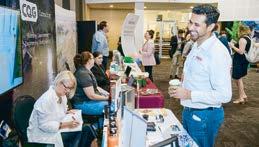
sightseeing cruise of the Gladstone Harbour on the evening of Tuesday, 1 October with drinks, food, and live entertainment provided to set the scene on the exclusive Speaker/ Sponsor Networking Harbour Cruise.
• Attend the Gladstone Engineering Alliance
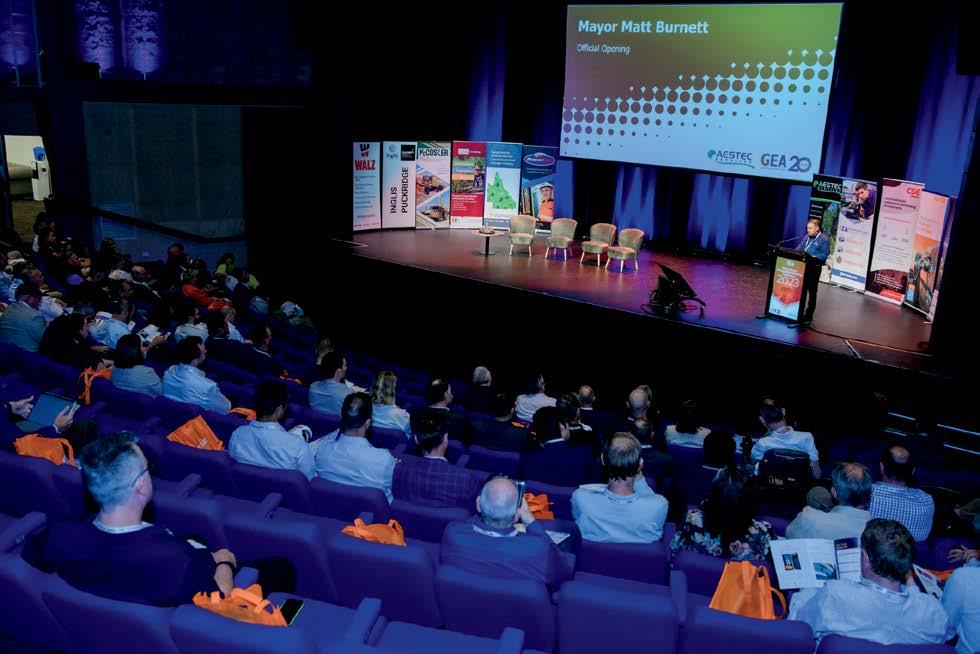
Major Industry Awards night.
• The Conference will conclude with a Networking Opportunity for all attendees. Tickets are available online at gea.asn.au/ events with discounted rates available to GEA members.
























Young women from across Queensland, including Gladstone, Biloela and Moura, gathered in Brisbane last month to celebrate their completion of a unique six-month female mentoring program.
The 20 Year 12 students have been involved in the popular Girls in Resources Leadership Skills (GIRLS) mentoring program with each young woman connected to an experienced female mentor working in the resources industry.
The GIRLS mentoring program is delivered by the Queensland Minerals and Energy Academy (QMEA), the education arm of the Queensland Resources Council (QRC), in partnership with Women in Mining and Resources Queensland (WIMARQ).
QRC chief executive officer Janette Hewson said the GIRLS mentoring program, is now in its sixth year, and has had a positive impact on the young women who have been through the program and the resources industry.
“Having a mentor in the resources sector, while completing your Year 12 studies, is invaluable and will help the students as they make decisions about their career pathway,” Ms Hewson said.
“It is an exciting time to join the resources sector as we meet the challenges of increasing sustainability and decarbonisation targets, while meeting productivity demands.
“We need the enthusiasm and innovation of young people to help us on that journey.”
More than 80 per cent of previous participants in the mentoring program have gone on to have a professional or trade career in the resources sector.
BMA’s head of human resources Tamara Barden said they were delighted to be involved in a program which inspired young women to achieve their career goals.
“This is about more than financial sponsorship, many of our people have been involved in the program as students and then returned to be a mentor to others, which is a testimony to its success,” Ms Barden said.
“The GIRLS mentoring program connects the students with a mentor who can guide them as they make decisions about their tertiary or training studies after school.
“It is a highly respected program which is having an impact, with four out of five participants going on to have a professional or trades career in the resources industry.”
In addition to BMA, the program has been supported by: ConocoPhillips: Jellinbah (gold sponsors); Glencore Technology; Rio Tinto; Thiess; Whitehaven Coal (silver sponsors); Coronado: Fitzroy: Idemitsu (bronze sponsors).


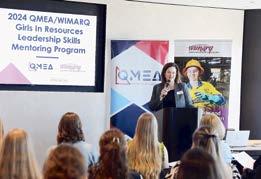
QRC skills, education and diversity policy director Katrina-Lee Jones said it has been pleasing to see the young women being mentored describe the program as an extremely positive experience that has increased their interest in one of the many different careers in the resources sector.
“It’s very rewarding to see the young women build better self-confidence through the mentoring program and improve their public speaking skills,” she said.
“More women and more mentors will en-
courage greater diversity in the resources sector as well as better opportunities for young women.
“Our plan is to continue building on the success of the program and open it up to more girls next year.”
Some of the most common challenges included defining career goals with so many options available and building student’s knowledge of the breadth of careers in the resources and energy sector.
Supporting participants in dealing with
gender imbalances and learning how to network are important benefits of the mentoring program.
Students graduating from the 2024 GIRLS mentoring program are from a number of Central Queensland schools, including Pioneer State High School
Moranbah
Gladstone
By Matthew Pearce
Rockhampton business Fatz Fabrication is going from strength to strength thanks to an almost $100,000 funding boost from the State Government’s Manufacturing Hubs Grant Program.
Manufacturing Minister Glenn Butcher dropped into the business’s Parkhurst premises earlier this month to inspect their capabilities during Queensland’s Manufacturing Month.
Mr Butcher said the $94,000 funding would enable the business to purchase and install a 3D scanner, Freescan combo machine and powder coating spray booth, as well as employ six new full-time staff.
“For too long we’re seen previous governments sending manufacturing overseas, including train manufacturing,” Mr Butcher said.
“We are bringing manufacturing back to Queensland. Not only that, but NSW and Victorian companies are looking to set up in Queensland, for one reason - they know they’ll get support from a government that cares about them.
“That’s why we have six manufacturing hubs set up in regional Queensland, including one right here in Rockhampton.”
The State Government has invested more than $240 million in supporting manufacturers across the state through Made in Queensland Grants, Manufacturing Hub Grants and the six manufacturing hubs.
Fatz Fabrication director Nathan Johannesen said his business had grown from strength to strength since it started in 2009 and now had about 15 staff.
“We have a strong focus on quality and targeting the premium end of intake and exhaust components for the 4WD industry,” he said.

“We are very grateful for the grant and look forward to seeing the growth that comes from this.
“We will soon have our powder coating system up and running and the 3D scanner has already arrived on site.”
Mr Johannesen said without the grant, he wouldn’t have been purchasing the new equipment anytime soon.
“We’re absolutely thrilled about this development and are confident that this investment will yield substantial returns for our operations in the years to come,” he said.
“By enhancing our in-house capabilities,








we are not only cutting down on the costs and delays associated with outsourcing but also positioning ourselves to deliver higher-quality products more efficiently.
“This new capability will mean we save significantly on outsourcing work and materials, which directly translates to reduced lead times, increased production capacity, and a notable boost in productivity.
“It also opens up new avenues for growth, enabling us to explore and secure new markets.
“With this support from the Queensland Government, we are well on our way to be-
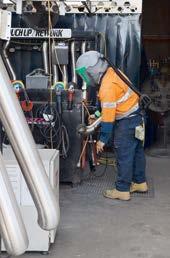
coming a leader in advanced manufacturing, adopting cutting-edge technologies that set us apart in a competitive market.
“This grant is not just an investment in our business but in the future of local manufacturing, skill development, and regional economic development.”
Almost 40 exhibitors demonstrated and displayed their products and capabilities as part of a manufacturing showcase at Queensland’s Parliament House, on Tuesday, 10 September, to an audience of about 300 invited guests.
Federal Employment and Workplace Relations Minister Murray Watt used National TAFE Day on Tuesday, 10 September to celebrate the contribution of students, teachers and support staff across Queensland.
Senator Watt said there had been more than 84,000 Fee Free TAFE enrolments since 1 January 2023.
“The Albanese Government is pleased to deliver Fee-Free TAFE, which is removing financial barriers for more Queenslanders to learn new skills in areas of demand,” he said.
“Fee-Free training offers a huge cost of living relief for Queensland students, grows
the recruitment pool for businesses and eases skills shortages across the state.”
TAFE delivers a pipeline of skilled workers while supporting rewarding, well-paid job opportunities right across the Sunshine State. The care sector has been the top industry for enrolments, with courses in health care, aged care and disability care attracting 15,490 enrolments. Enrolments have also been strong in technology and digital (10,954), construction (6,747), manufacturing (4,763), and early childhood education and care (4,618). More than 30 per cent were from regional and remote areas in Queensland, including many in Central Queensland.









It was this month (September), in 1962, that a commercial salesman, instead of selling jewellery and fancy goods to a store, in East Street, Rockhampton, got a loan for 7000 pounds and bought it.
He rejected an important marketing rule on taking over the business, do not change its name, unless you must, be it a legal requirement or negative connotations with the name.
After all you are buying the goodwill of that business (its brand value) along with the stock.
His justification for the name change though, was simple, people should know the name of the person they are doing business with.
A local independent business was being replaced with another.
Not such a strange thing back in the 60s.
These days it is not as normal.
It is now more, store sameness, with name (brand) and presentation, through either corporate expansion or by franchising, rather than a totally new store, opening.
Compare the store names in a shopping centre, in one town to another, and you see sameness. This Commercial Salesman, on buying the business, started to make changes, then just its name, introducing new products.
He was following his gut instinct, experience, customer feedback, on what would sell, rather than following a written how-to manual.
This independent spirit saw the business expand to two stores in East Street, then consolidating, and then again expanding to two stores, till buying and relocating to one store.
The business is still in East Street, 62 years later, and still bearing the name of the Commercial Salesman, but now owned and operated by his son and daughter-in-law.
That store is Phil Peel Jeweller, and the only place you’ll find Phil Peel Jeweller is in Rockhampton.
The owners, David and Kerry do the stock buying, presentation and set their own KPI’s for the store, not someone in Sydney or Melbourne.
Often you will be greeted by David or Kerry in their store.
Though David is known to, occasionally, get a game of golf in, or attend a horse racing event, in his role as a Rockhampton Jockey Club committee member.
Phil Peel Jeweller also supports a number of community events and causes.
They are your typical local, independent business.
An absolute vital ingredient of any vibrant community.
Contributing to the character, personality, even soul, of the community.
Local, independent businesses create jobs, invest in their community, support it, active within it, and evolve with it.
Most importantly, local, independent businesses signify that entrepreneurialism and innovation is flourishing in the community.
Contributing to a unique community personality and an inspiration for others to write their own how-to manual; give their entrepreneurial dream a real go, like a young Phil Peel did, taking on that bank loan.
Giant online shopping sites may appear very attractive, but what do they add to the community, except more waste at the dump?
To live in a more vibrant, resilient, sustainable community, we need to cut back on what we spend with the online monoliths and multinational chain stores.
And spend that amount with a local, independent business.
Businesses with more than a local presence, they are intertwined into the very community presence, the soul of it.
That bit that helps make your community extraordinary.
The businesses you support, shapes how your town evolves.


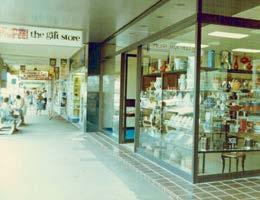

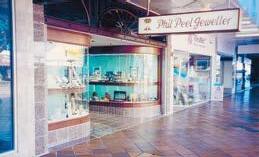

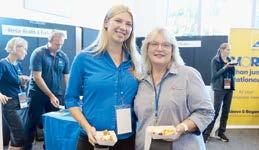

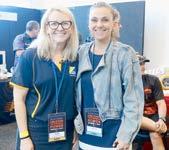
A who’s who of the CQ business community attended the Harvey Norman Unleash the Business Power Seminar and Expo at the Yeppoon Town Hall on Thursday, 29 August, and Industry Today journalist MATTHEW PEARCE was there to snap some photos. See who was spotted out and about.
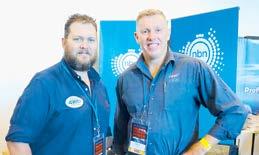
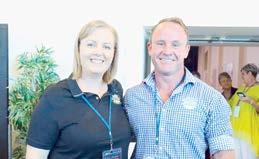







Queensland Resources Council (QRC) has welcomed the $2.5 million announcement by Opposition Leader David Crisafulli for more investment in skilled employment across the regions and women in the resources sector.
QRC chief executive officer Janette Hewson said the funding, if the LNP is elected in October,wouldsupporttwoprogramsoutlinedinthe organisation’s 2024 Election Priorities that seeks to secure a prosperous future for the Sunshine State.
“The QRC welcomes the announcement by the Opposition for $2.5 million to develop a skills pipeline for the resources sector and encourage more women into operating and technical roles,” Ms Hewson said.
“This investment addresses one of the key challenges facing the resources sector and
regional communities to attract and retain a skilled workforce.”
The funding will enable the education arm of the QRC, the Queensland Minerals and Energy Academy (QMEA), to establish new regional education hubs and expand into 50 primary and secondary schools.
An investment of $2 million over three years will support regional areas to strengthen the talent pipeline and address enduring skill shortages particularly across STEM fields.
The hub would embed educators in the regions to deliver practical workshops in local schools encouraging students to pursue STEM vocational and academic pathways securing their skills for future employment in the resources sector.
“As an industry we are making major invest-
ments to attract and retain skilled workers and encourage young people to consider one of the many careers available in the resources sector,”
Ms Hewson said.
“We are pleased the Opposition recognises the need for regional education hubs to support local schools and have listened to the QRC and its members’ calls to encourage more women into the sector.
“The announcement also recognises the Opposition is listening to the QRC’s 2024 Election Priorities released last month and comes after recent announcements that the LNP supports the return of the Resources Sub-Committee into Cabinet and Regulatory Impact Statements.
“This is a positive start to what the resources sector is seeking from (the) State Government and an important milestone for young people
and women who want to live, train and work in their local community.”
Another $500,000 has been announced by the Opposition for a QRC-led training program and public awareness campaign to encourage more women into operating and technical roles.
Ms Hewson said there are currently only 15 per cent of women in operating roles and this initiative will encourage more women into the sector.
“It’s essential that we continue to attract and retain women in STEM and field positions,” she said.
“The resources sector offers women an opportunity to participate in an industry that significantly contributes to Queensland and to regional communities.”

The Small Business Association of Australia (SBAA) has welcomed the State Government’s adoption of a new charter.
SBAA founder and chief executive officer Anne Nalder said the approval of the Small Business Charter of Australia was a significant step forward in empowering small businesses across the Sunshine State.
“This is a monumental milestone for the Small Business Association of Australia and for every small business in Queensland,” she said.
“The adoption of the Small Business Charter of Australia by the Queensland Government is a testament to the importance of small businesses and their vital role in our economy.
“We are immensely proud of this achievement and look forward to seeing the positive impact it will have on small businesses across the state.”
The charter, which has been in development since 2018, is a comprehensive framework designed to address the core needs of small businesses.
It is built on ten pillars: entrepreneurship, industrial relations, technology, competitiveness, finance, tax, regulation, trade, education and training, and climate change/energy.
State Employment and Small Business Minister Lance McCallum said the charter would foster a sustainable economic environment.
“Our small businesses are the engine room of the economy, the heart and soul of our communities, and there is no better place in the country to be a small business owner, operator, or worker than Queensland,” he said.
“We can thank a small business – our local tradies, hairdressers, and cafe owners – and those that support them with initiatives like the Small Business Charter of Australia for growing our economy and supporting our regions and local communities.
“The Miles Government is so serious about our commitment that our new Queensland Small Business Strategy: powering small business provides a $250 million boost to the opportunities, capability, and diversity of Queensland’s small business sector.
“Our new plan for the future will deliver a range of actions over three years to support and enable small businesses to thrive and combat the pressures associated with the cost-of-doing business.
“By adopting the Small Business Charter of Australia, the Miles Labor Government is reaffirming our commitment to creating a supportive and inclusive environment for small businesses.”
The charter aims to create a supportive environment where small businesses can thrive, innovate, and contribute to the national economy.
A key component of the charter is the “Think Small Business” principle.
This principle emphasises the need for policymakers to prioritise the needs of small businesses when creating legislation and policies.
By adopting a “Think Small Business” mindset, the charter ensures that the unique challenges and opportunities faced by small businesses are at the forefront of policy decisions.
This approach helps in reducing regulatory burdens and fosters an environment where small businesses can flourish without being overshadowed by larger enterprises.
Ms Nalder said it was a great example of small business working with government.
“The Small Business Association of Australia extends its heartfelt thanks to the Premier of Queensland, Steven Miles, and Minister Lance McCallum MP for their support and leadership in championing this cause,” she said.

